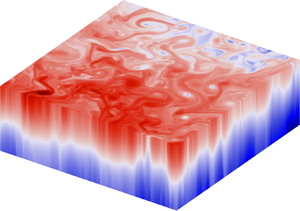Article contents
Transport and emergent stratification in the equilibrated Eady model: the vortex-gas scaling regime
Published online by Cambridge University Press: 12 September 2022
Abstract

We numerically and theoretically investigate the Boussinesq Eady model, where a rapidly rotating density-stratified layer of fluid is subject to a meridional temperature gradient in thermal wind balance with a uniform vertically sheared zonal flow. Through a suite of numerical simulations, we show that the transport properties of the resulting turbulent flow are governed by quasigeostrophic (QG) dynamics in the rapidly rotating strongly stratified regime. The ‘vortex gas’ scaling predictions put forward in the context of the two-layer QG model carry over to this fully three-dimensional system: the functional dependence of the meridional flux on the control parameters is the same, the two adjustable parameters entering the theory taking slightly different values. In line with the QG prediction, the meridional heat flux is depth-independent. The vertical heat flux is such that turbulence transports buoyancy along isopycnals, except in narrow layers near the top and bottom boundaries, the thickness of which decreases as the diffusivities go to zero. The emergent (re)stratification is set by a simple balance between the vertical heat flux and diffusion along the vertical direction. Overall, this study demonstrates how the vortex-gas scaling theory can be adapted to quantitatively predict the magnitude and vertical structure of the meridional and vertical heat fluxes, and of the emergent stratification, without additional fitting parameters.
Information
- Type
- JFM Papers
- Information
- Copyright
- © The Author(s), 2022. Published by Cambridge University Press
References
REFERENCES
- 7
- Cited by


